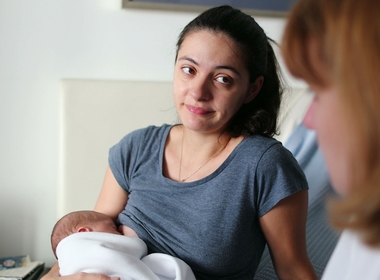Explore the link between physical and mental health during and after pregnancy. Learn how conditions like hyperemesis gravidarum, pelvic girdle pain, and insomnia can affect your mental wellbeing, plus tips for managing these challenges.
Jump to: Link between physical and mental health | Pregnancy conditions and symptoms | Other physical conditions | Seeking help | Final reminder
Pregnancy and early parenthood are physically and emotionally demanding.
Discomfort, pain, sickness and tiredness can affect not only your body, but your mind as well. If you have a physical health condition that affects your pregnancy, it’s even more important to focus on your mental health too.
Below, we’ll explore how some physical conditions or pregnancy symptoms can affect your mental health, and offer you practical tips for managing these challenges.
This list is not exhaustive and there are many conditions that can affect your mental health. The ‘Seeking help for your mental health’ tips are for anyone navigating physical health challenges during or after pregnancy.
Your physical and mental health are connected. For example, you might:
As many as 1 in 4 women and birthing people experience mental health problems during or after pregnancy, but if you’ve had a difficult pregnancy or birth, you’re more likely to experience perinatal mental illness.
Physical conditions can affect your mental health during pregnancy. By understanding the connection between physical symptoms and your mental wellbeing, you can take steps to look after both your body and mind.
Hyperemesis Gravidarum (HG) is a severe form of nausea and vomiting during pregnancy. It affects between 1 and 3 pregnant women and birthing people out of every 100.
Unlike morning sickness, which typically improves after the first trimester, HG can last throughout pregnancy. It can cause dehydration, malnutrition, and weight loss.
The relentless nature of HG can take a heavy toll on mental health.
According to Pregnancy Sickness Support, HG sufferers are up to 8 times more likely to experience antenatal depression (depression during pregnancy).
If you have HG, you might experience:
Pregnancy Sickness Support are specialists in HG. Visit their website for more information about HG and specialist support.
Some women do not have any nausea in pregnancy, while others experience sickness ranging from mild and temporary to severe and persistent.
Having nausea or sickness in pregnancy, or just the thought of it, can trigger mental health difficulties for some people.
The perinatal period presents numerous potential triggers for anybody who has current or previous experience of an eating disorder. Morning sickness can cause disordered thoughts or behaviours around food to reappear even when they had previously been under control.
See our article on Understanding perinatal mental health conditions for more information, or visit Wednesday’s Child for support. The website Eating Disorders and Pregnancy also has fantastic resources for anyone navigating pregnancy with a history of eating disorders, and their healthcare team.
If you have emetophobia (fear of vomiting), pregnancy-related nausea and sickness can be deeply distressing. It may worsen anxious or obsessive thoughts around eating specific foods or being in certain situations. You might also feel guilt or shame if you’re finding it difficult to eat a balanced diet.
Try to focus on eating foods that feel manageable and drinking plenty of water. Seek support from your GP or midwife if you’re struggling.
Pelvic girdle pain (PGP), or symphysis pubis dysfunction (SPD), is a pregnancy condition that causes pain in your pelvic joints, commonly your hips, back and thighs. It can make everyday activities like walking, standing, or even turning in bed incredibly painful.
PGP and other conditions that limit your mobility, like diastasis recti (separated stomach muscles), can lead to frustration and feelings of helplessness.
61% of women with PGP experience mental health problems during or after pregnancy.
PGP might lead to:
Go to the Pelvic Partnership website for help, emotional support, and tips for everyday activities.
Conditions like pre-eclampsia, gestational diabetes, or other worries about your physical health can cause stress and anxiety about the wellbeing of both you and your baby.
It’s normal to worry, but please share this with your healthcare team and any trusted friends or family members so they can support you.
Pre-existing physical health conditions can affect your mental health during pregnancy, so it's important to think about the support you might need.
Sickle cell disease (SCD) is a group of conditions affecting the red blood cells. The most serious type is called sickle cell anaemia. The main symptoms of SCD are severe pain (pain crises) and reduced oxygen flow, causing fatigue, weakness, and anaemia.
Pregnancy is considered high-risk for people with SCD.
Someone with SCD might experience:
Sickle Cell Society and Sickle Cell & Thalassaemia Support Project are specialists in SCD and can provide guidance and community for people living with SCD. Visit their websites for more information on managing SCD in pregnancy and supporting your mental health.
Sleep deprivation can significantly affect perinatal mental health. Exhaustion makes it more difficult to manage emotions, which could leave you feeling irritable, anxious, or overwhelmed.
Lack of sleep is often dismissed as a normal part of having a newborn. However, not being able to sleep or rest, even when your baby is asleep, can be a sign of perinatal mental illness. This should be taken seriously and not ignored.
Back pain, leg cramps, constipation, and other ongoing causes of discomfort such as swelling or itching can chip away at your mental resilience, especially when it’s hard to find relief.
Occasionally, these symptoms may need further assessment to rule out a more serious cause. If you have ongoing aches, pains or other symptoms, please speak to your midwife or doctor for advice.
Once you have spoken to a healthcare professional, you may also find it helpful to:
If physical symptoms are affecting your mental health, remember that you are not alone. It’s important to tell someone how you feel, whether that’s a healthcare professional, partner, trusted friend, family member or specialist charity.
It can be helpful to:
Do not underestimate the connection between your body and mind. With the right help, and by treating yourself with kindness, you can navigate these challenges.
Find out more about perinatal mental health, treatment and support.

Learn about perinatal mental health conditions, including signs, symptoms, and causes.

Discover treatment options for perinatal mental illness, including therapy, medication, peer support, and specialist care.

Discover how fertility challenges and assisted conception can impact perinatal mental health.
Published: May 2025 Next review: May 2028